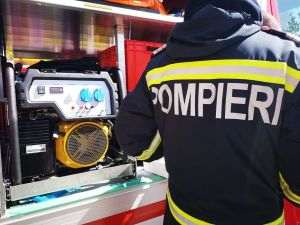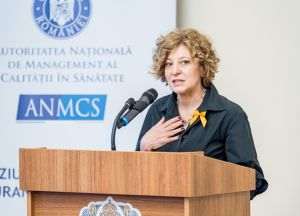Energy efficiency is the best first "fuel" for development that Romania has, said yesterday, Daniela Dărăban, executive director of the Federation of Associations of Energy Utility Companies (ACUE), on the occasion of the finalization conference of the "Energy Efficiency in smart houses, smart buildings and smart networks", financed with 222,000 euros, of which 199,800 euros were received as a grant through Innovation Norway - the Norwegian financial mechanism 2014-202, through the Energy Program in Romania.
Daniela Dărăban stated: "Energy efficiency is an important resource, often ignored even though it is accessible. We called it a huge fuel deposit, and the increased interest of the public makes us optimistic that the information made available, through the expertise we have benefited from, can really contribute to good information, understanding and application of energy efficiency measures. Public institutions play a key role in correctly understanding the concept of energy efficiency. Unfortunately, the starting point for Romania is a mentality that reminds us of some moments that we must forget. In the minds of some, energy efficiency is mixed with the energy rationing policy during the communist regime, which is not true. It is up to us to correct this misunderstanding. From my point of view, energy efficiency is the best first "fuel" for development that Romania has. Before we talk about investing in new resources, we should see what we can save through projects that help us consume less. Experience must be combined with experience in communication. Communication is very important both in the relationship with the authorities and with the citizens. We found a lot of interest from local authorities, but they don't have enough information and data to translate into energy efficiency actions. It is very important that clear information about the concept of energy efficiency reaches the public. I think this is what we lack in order to have public policies, which must be implemented in collaboration with those who are targeted by these policies".
The project implemented between February 7, 2023 and April 30, 2024 by ACUE in partnership with the Association for Clean Energy and Combating Climate Change (AECCSC) included 10 events dedicated to household consumers, public institutions and those interested in producing energy from renewable sources that can be integrated efficient in the distribution networks, supported by information campaigns focused on the awareness of energy waste, on the solutions at hand to reduce consumption, without reducing energy comfort.
• 8 million people informed about energy efficiency through the ACUE-AECCSC project
Over 380 people participated in the 5 webinars dedicated to household consumers, and over 190 representatives participated in the 5 workshops dedicated to administrative-territorial units and public institutions.
In addition to the information seminars, the project also created a web platform, efficient-energetic.ro, four video infographics, an online information campaign and a study on the energy efficiency of some buildings in the municipality of Târgu Mureş were made.
Cristina Păun, ACUE deputy director said: "By 2050, the estimate is that half of European citizens could produce up to 50% of renewable energy, according to a recent analysis by the European Commission. In more and more places, citizens are coming together in communities to play an active role in the energy market. I chose Târgu-Mureş for the realization of a case study, in order to highlight the implications and advantages brought by integrated energy systems, as well as the prospects for the sustainable future of the production of electricity and thermal energy for self-consumption".
Regarding the project, the ACUE representatives showed that, if at its start they estimated a target of 400,000 people, at its completion they can say that the entire information campaign reached almost 8 million people.
Răzvan Nicolescu, the president of AECCSC, a partner in the project of ACUE, showed that energy efficiency is not a spectacular theme in a world or society where there is talk of "flying reactors, floating pipes and cars that go backwards", and added that this field must contribute to solving the problems facing the energy sector: security of supply, sustainability and competitiveness.
Mr. Nicolescu mentioned: "This information campaign was a success, even beyond what we expected. It is a concrete thing done for people we have helped to be better informed, to better understand the current opportunities offered by a more efficient consumption. And Norway's support in the development of this project also meant a perfect guide in terms of energy efficiency. Norway is an inspirational example, demonstrating that a combination of strategic vision, collaboration between the public and private sectors and the active involvement of citizens can lead to the creation of a sustainable and energy-sustainable society. In Romania there are millions of buildings, of which almost 250,000 are in the public area, with energy efficiency standards far below the European average. We should have a country project to improve the energy efficiency of these buildings. (...) Maybe we should solve energy efficiency problems on groups of public buildings, for example hospitals or schools. For the renovation and modernization of schools from the point of view of energy efficiency, a single tender could be organized at the national level and the contract awarded to a consortium of companies to do actual modernization and efficiency work. Financing can be provided through European funds or through ESCO contracts (n.ed. - energy services contract concluded between a beneficiary and an energy service provider that proposes the implementation of energy efficiency measures, checked and monitored throughout the contract period; the investments to achieve the project will be recovered from the financial savings, resulting from the improvement of energy efficiency; thus, without investing own funds, the beneficiary will receive a lower energy bill)".
• Răzvan Nicolescu: "Household consumers must be encouraged to carry out energy efficiency works"
Regarding the energy efficiency of private buildings, the president of AECCSC believes that individuals should be encouraged to do these works.
Răzvan Nicolescu specified: "For example, the state should contribute 0.2 euros, to one euro paid by the person in question, because we have a lot of money allocated by the European Union that we don't really spend. If the individual or the owner/tenant associations refuse this incentive system, then in 4-5 years a coercive system can be introduced to sanction those who do not carry out such energy efficiency works".
We note that the maximum energy saving potential is found in buildings, the proper insulation of which can bring savings of up to 40-50% of consumption, depending on the type of building. Each year, only 1% of the existing building stock undergoes energy renovations. According to Eurostat, in our country 8 out of 10 buildings require thermal rehabilitation, being built before 1980 and approximately 1.3% of blocks are renovated annually. Public buildings are responsible for approximately 40% of energy consumption recorded at national level. The 242,000 public buildings have an energy consumption of over 200-250 kWh/m2 compared to a recommended European average of 140 kWh/m2. A quick calculation shows that if we reached the recommended consumption per square meter, we would achieve an annual saving of over 6 billion lei, which, according to ACUE, could be used to build 10 medium-large schools or 2 hospitals regional.
















































